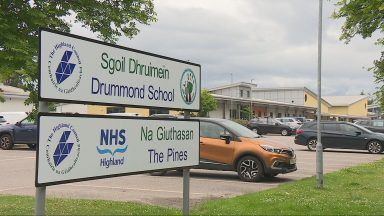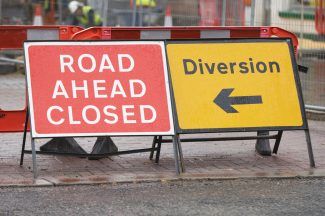Nicola Sturgeon has set how she believes a second referendum on Scottish independence could be held if Westminster continues to block her plans.
The First Minister said the Scottish Government would be referring the provisions of its referendum Bill to the UK’s highest court on Tuesday afternoon.
Following Sturgeon’s address to the Scottish Parliament on Tuesday, we now know how she plans to hold a second vote but many questions remain unanswered.
Here are the key takeaways from the First Minister’s statement.
What is the proposed date for the vote?
October 19, 2023 has been proposed as the date of the referendum. However the matter will be referred to the Supreme Court to establish its legality.
Sturgeon said she wanted an “indisputably lawful” referendum to take place, arguing that her opponents would challenge the Scottish Government’s proposal in the courts if she did not go to the judiciary herself.
She also said that in the event the court ruled that her proposals are outside the legislative competence of the Scottish Parliament, the next general election will become a “de facto referendum”.
The UK Government has consistently said it is opposed to a Section 30 order that would grant Holyrood the power to hold another referendum.
What question will be on the ballot paper?
“Should Scotland be an independent country?”
Indeed, the Scottish Government’s Bill proposes the same wording of the referendum question eight years ago.
The Bill also proposes a “consultative, not self-executing” referendum, she said, claiming it had the same legal status as the vote in 2014.
How did Sturgeon make the case for independence today?
The First Minister insists the SNP has been given a “mandate”, along with the Scottish Greens, for another vote.
She said: “We lack the full range of levers to shape our economy and grow our country’s wealth, we are powerless to stop our budget being cut.
“Independence is about equipping ourselves to navigate the future, guided by our own values, aspirations and interests.”
Sturgeon said independence wouldn’t always be easy but that it would give Scotland the opportunity to pave its own future.
She added: “Nothing in life is guaranteed, but with hard work and the independence to chart our own course, Scotland will prosper.”
How will the First Minister put it in motion?
Sturgeon has written to Prime Minister Boris Johnson to make it clear she is “ready and willing” to negotiate the terms of a Section 30 order.
This is a section of the Scotland Act that permits Holyrood to pass laws in areas that are normally reserved to Westminster.
To achieve “legal clarity” over the Scottish Government’s plans, Sturgeon said that Lord Advocate Dorothy Bain, the Scottish Government’s most senior law officer, had agreed to refer the matter to the UK Supreme Court.
But with the Prime Minister having repeatedly refused her calls for another referendum to be held, Sturgeon added “What I am not willing to do, what I will never do is allow Scottish democracy to be a prisoner of Boris Johnson or any prime minister.”
The First Minister stated: “My determination is to secure a process that allows the people of Scotland, whether yes, no or yet to be decided, to express their views in a legal, constitutional referendum so the majority view can be established fairly and democratically.
“The steps I am setting out today seek to achieve that.”
What happens if the bill is blocked?
If the Scottish Government is denied legal powers to hold a referendum, the First Minister said they would use the next UK general election as a de facto referendum.
This means the SNP would fight the general election on the single issue of independence and Scots in favour would be asked to vote for them. This would then be used as a mandate for independence as opposed to another referendum.
Sturgeon said that in the “weeks and months ahead” the Scottish Government would “make the positive case for independence” and would “do so with commitment, confidence and passion”.
She added: “Let the opposition if they can make the case for continued Westminster rule and then let the people decide.”
How did Downing Street respond?
Prime Minister Boris Johnson continues to believe it is “not the time to be talking about” a second referendum on Scottish independence, Downing Street said, while vowing to “carefully study” the Scottish Government’s proposal.
A UK Government spokesperson said: “We are clear that now is not the time to be talking about another independence referendum.
“People across Scotland want to see both of their governments working together on the issues that matter to them. That includes tackling the cost of living, ensuring energy security, leading the international response against Russia’s invasion of Ukraine and growing our economy. That remains our priority.
“A decision has been taken by the First Minister to publish a Bill, and the Lord Advocate has made a referral to the UK Supreme Court. UK Government law officers will now consider their response.”
What are the opposition at Holyrood saying?
Scottish Conservative leader Douglas Ross branded the Scottish Government’s proposal “painfully illegal” and said it was “the wrong priority for Scotland” to use government time and resources to “break up the country.”
Meanwhile, Labour leader Anas Sarwar said the First Minister should consider the “timing, context and effect” of a referendum and claimed “two-thirds” of Scots don’t want independence.
He cited figures such as 10,000 children waiting for a mental health appointment and 20,000 fewer businesses in Scotland than before the pandemic. With inflation set to reach 11 per cent, he warned the cost of living crisis is likely to worsen.
Sturgeon said in response that “democracy is allowing people to choose,” and is the only way to resolve differing opinions of constitutions.
She responded that the budget is cut by the Tories at Westminster – a government Scotland “didn’t vote for” and money is being taken by the poorest in society.
“To build the country we want, we must put levers and control in the hands of the people of Scotland. That’s what independence is about.”
Follow STV News on WhatsApp
Scan the QR code on your mobile device for all the latest news from around the country



























